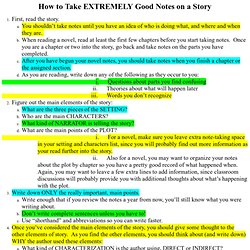

How to Write an Essay Like the Pros. Write Well - Macalester College. Her majesty helps. Writing Specific Characters - Advice. HERE TO HELP, Describing clothes. How to show but not to tell. How to Write Fan Fiction. How To Write Better Fan Fiction: 184 quick and easy hints to improve writing (Click here to browse 70 topics on my main site ranging from exotic kaleidoscope designs to the strange world of lucid dreaming or click on writing to return to the main How to Write Better Fan Fiction page.)

This modified version of my general writing book, Amateur to Amateur: A Non-expert's Guide to Expert Writing, is intended to assist fan fiction authors to write better stories. No part of it may be reproduced without my permission. This text is intended to be read from this web page. Transferring it to another location may delete important formatting, like spacing, font control and italics, which are critical to understanding what was written. I'll help if I'm bothered. Her majesty helps. L'enfer, c'est les autres.
Tumblr_ne56nv6WaX1rnvzfwo1_1280.jpg (JPEG Image, 736 × 1041 pixels) - Scaled (96%) Official team mom. It’s essay writing season for tons of students! ... How to Write a Character Analysis in 10 Easy Steps. Introduction As you were reading your assigned work, you had probably been engaging in an informal character analysis without even knowing it, whether from your own opinions, text you selected to highlight, or notes that you wrote.

With a little guidance on what to do with those various notations, writing a character analysis should not be a problem! 1) Pay attention to the character’s ethics. Does the character make just or unjust choices? Consider Atticus Finch in Harper Lee’s To Kill a Mockingbird. 2) Decide whether the character’s actions are wise or unwise. 3) What is the character’s motivation? 4) Consider the effects of the character’s behavior on other characters. 5) Look for repeatedly used words that describe the character. 6) Be aware of items associated with the character. 7) Read between the lines. 8) Is the character “flat” or “round”? 9) Consider the historical time period of the character. 10) Finally, what does the author think? How to Write a Character Analysis: 7 Steps.
How to Take Notes From a Novel. How to Take Notes for a "Chapter Book" Book Report: 25 Steps. How to Take EXTREMELY Good Notes on a Story. How to Take EXTREMELY Good Notes on a Story First, read the story.

You shouldn’t take notes until you have an idea of who is doing what, and where and when they are. When reading a novel, read at least the first few chapters before you start taking notes. Once you are a chapter or two into the story, go back and take notes on the parts you have completed. After you have begun your novel notes, you should take notes when you finish a chapter or the assigned section.
I. Ii. Iii. Figure out the main elements of the story: What are the three pieces of the SETTING? 10 practical tips for writing better exam essays -DC IELTS. The key words in the title are practical and exam.

Last week I ran a “competition” to write an essay on aid and poverty. The essays I received were spectacularly good and I do suggest you check them out in the comments section. My one worry though was were they really practical essays in an exam. My essay, which you will find below, is I think much simpler than almost all the essays I received – and perhaps a more practical model for exams.
I should add that these are mostly band score 8.0 writing tips and are written especially for candidates who are aiming high. The road to band score 8.0 often means doing the simple things well 1. What does this mean? It’s important to link your paragraphs together – what more practical way to do that than just read what you have written?
2. One of my very first posts/articles on this site was headed “IELTS is not a test of intelligence”. The practical advice here is to select your best idea and write about that. Essay writing tricks. Essay Checklist. 15 Strategies for Giving Oral Presentations. More than death and taxes, the thing people fear most is speaking in public.

Needless to say, college students are not immune from this terror, which, for you psychology hounds, even has a name: glossophobia. Unfortunately, in college, it's not always so easy to avoid public speaking. Some schools have required courses in speech. And even in colleges where speech isn't a subject, there often is a broad variety of courses that incorporate presentations or reports–and sometimes full-length seminars–into the regular class activities. Still, there's no need to lose your breakfast (or lunch or dinner) over your upcoming presentation. 1. 4-Star Tip.